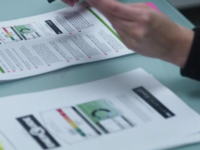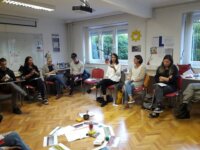Instead of composting or incinerating invasive alien plant species, we are developing new ways how to process them into new, useful products (paper and wood products, dyes and hybrid coatings, extracts for controlling of plant harmful organisms, food source, input materials for the industries of the future and 3D composites). Invasive alien species are a locally accessible and abundant resource and opportunity for a new business model, promoting zero‑waste approach and circular economy.
Innovation Tag: Citizen Engagement
The OEE established a Social Innovation "UnLab" (SIU) to test an embedded innovation model and amplify energy efficiency policy and service impacts in Canada. The SIU creates value for energy efficiency stakeholders in three ways:
Building relationships and capacity for energy efficiency policy and service innovation;
Generating evidence and collective learning by co-creating and testing insights and interventions;
Amplifying impacts by scaling learning and implementing what works.
A first of its kind (in our context), cross-jurisdictional partnership between three levels of government to research, co-design and test prototypes with citizens to inform and improve the experience and uptake of home energy efficiency labeling and reporting.
The core team was comprised of representatives from Natural Resources Canada’s (NRCan) Office of Energy Efficiency (OEE), the Province of Alberta’s CoLab, and the City of Edmonton with service design support from Situ Strategy.
In May 2016, the Mayor of San Francisco launched the Safe and Clean Neighborhoods Promise. This was a new initiative to improve the quality of life in San Francisco with a coordinated approach to delivering City services better and faster. He issued an Executive Directive to Department Heads responsible for quality of life issues directing them to prioritize services so all residents have access to clean, safe, maintained public spaces and facilities. To ensure success, the mayor created the…
The challenge the city Ljubljana wanted to address was how to approach young people who have ideas. What works well, and what could be even better? City Incubator is a programme for the implementation of the ideas of young people in Ljubljana. It is a sustainable tool for implementation and co-financing of local youth initiatives. Individuals or groups may put ideas forward and in the frame of the programme, they receive professional support for the fine-tuning, and financial support for the…
Case Study
Vitamin Lab: How to Take Citizen Responsiveness and Integrity in Health Services to the Next Level

The innovation was developed to tackle the problem of corruption in the Lithuanian healthcare sector. We conducted a Vitamin Lab experiment to find out if the change of the clinic’s environment indirectly affects the behaviour of patients, how it can influence their attitudes towards the clinic, increase transparency and reduce bribery. To our knowledge, it was one of the first initiatives to use this type of measured social design interventions in the context of healthcare sector corruption.
ProZorro.Sale is an electronic auction system aimed at transparent sales of state and local government assets. It involves a central database that conducts auctions and stores all the information about the transaction and commercial platforms connected to the database via Application Programming Interface (API). After the transaction all the information becomes public.
With the complex service system, it is difficult to help young people with numerous problems. The MY LIFE working method is a co-created, human service integration for young adults, complete with case management, a survey assessment, and an ePlatform.
In order to support the operation of certified cash registers, the Financial Administration (FA) launched a crowd-sourcing campaign in 2016 for the purpose of motivating consumers to receive an invoice, take it, check whether it is correct and send it to the FA. This way, every citizen was able to contribute crack down on invoice fraud and to reduce the shadow economy (which is the part of an economy involving goods and services which are paid for in cash, and therefore not declared for tax.)
MyInfo allows Singapore citizens to provide personal data, only once (if not already made available), instead of doing so for every government digital service. It aims to increase convenience and save time in digital transactions, while reducing cost by reducing hardcopy document verification.





